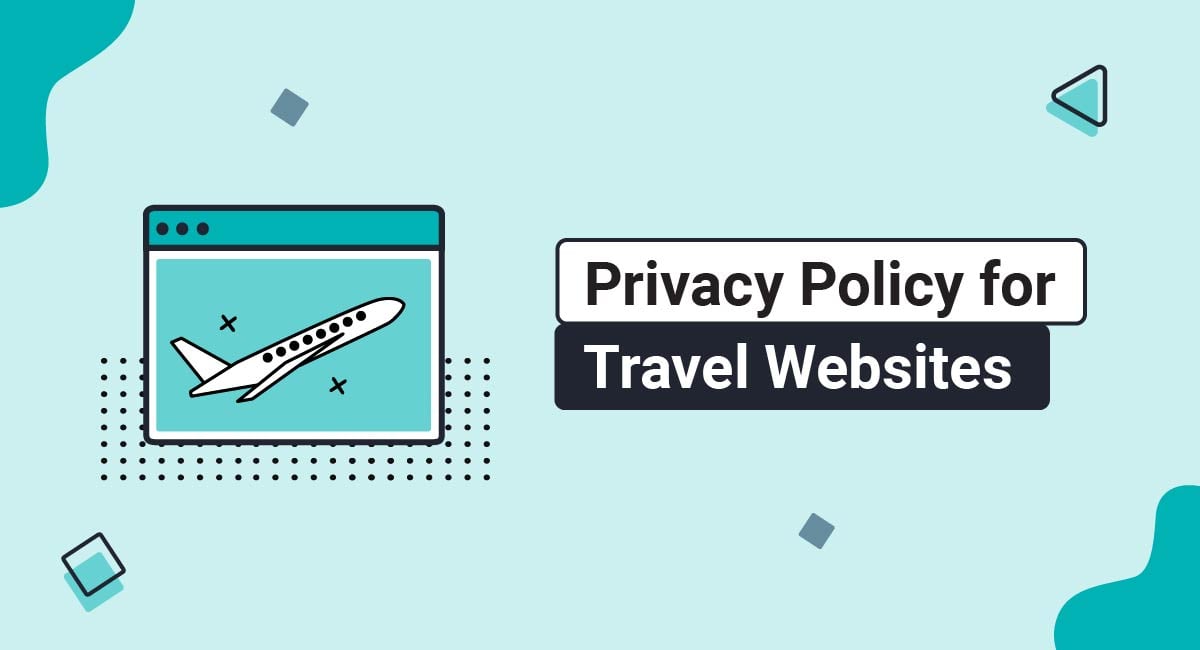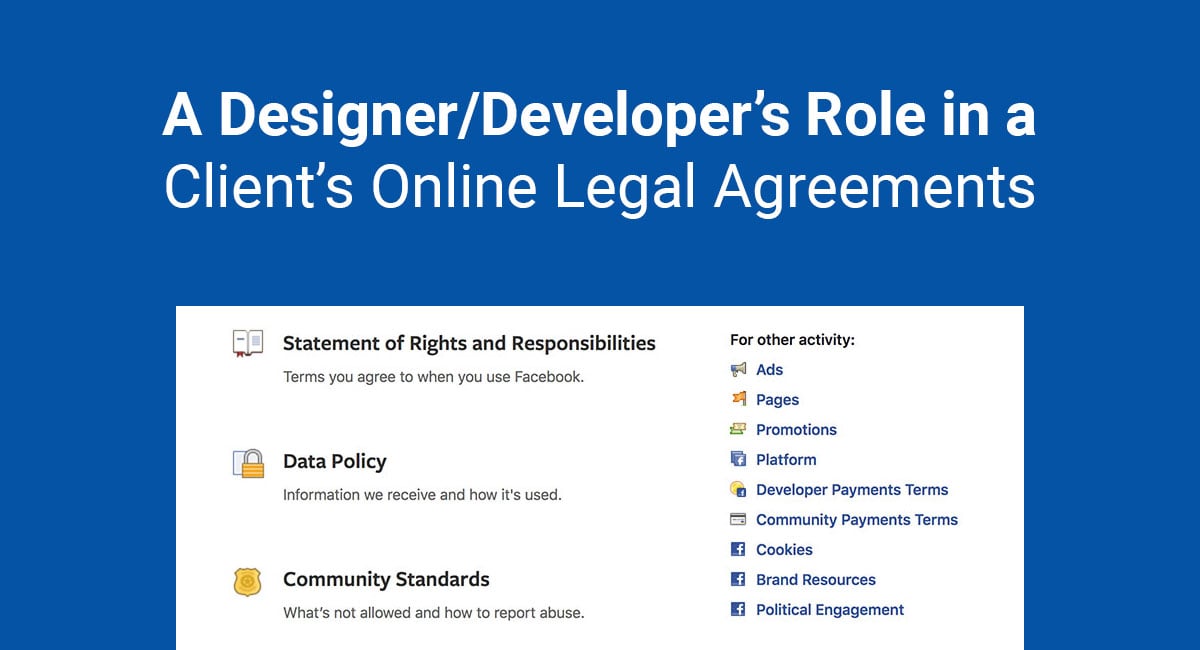If you run a travel website, you will legally need to have and post a compliant Privacy Policy. This is because privacy laws require a Privacy Policy when personal information is collected, and your travel website is likely collecting a variety of personal information.
This article will explore why your travel website needs a Privacy Policy and how you can create and display one effortlessly.
Our Privacy Policy Generator makes it easy to create a Privacy Policy for your business. Just follow these steps:
-
At Step 1, select the Website option or App option or both.

-
Answer some questions about your website or app.

-
Answer some questions about your business.

-
Enter the email address where you'd like the Privacy Policy delivered and click "Generate."

You'll be able to instantly access and download your new Privacy Policy.
- 1. What is a Privacy Policy?
- 2. Is Your Travel Website Legally Required to Have a Privacy Policy?
- 3. What are Some of the Privacy Laws that Affect Travel Websites?
- 4. What are Some of the Benefits of Having a Privacy Policy on Your Travel Website?
- 4.1. Helps With Legal Compliance
- 4.2. Boosts Brand Reputation
- 5. What Information Should Your Travel Website's Privacy Policy Include?
- 5.1. What Personal Information You Collect
- 5.2. Your Purposes For Collection of Personal Information
- 5.3. If You Share Any Personal Information With Third Parties
- 5.4. What Rights Consumers Have Regarding Their Personal Information
- 5.5. Your Contact Information
- 6. Where Should You Display Your Travel Website's Privacy Policy?
- 7. How Do You Get Consent to Your Travel Website's Privacy Policy?
- 8. Summary
What is a Privacy Policy?
A Privacy Policy is a legal document that discloses how you collect personal personal information, what you do with it, and what rights end users have regarding all of this.
Your Privacy Policy must inform visitors what types of personal information you collect, such as their email addresses or phone numbers. It must disclose how you process that personal information. If you share the personal information with third parties, for example, you should disclose that in your Privacy Policy.
If there are cookies on your site that track your visitors' browsing history, your Privacy Policy should also mention that. Cookies are small snippets of code that let you know if a person has visited your site before.
Is Your Travel Website Legally Required to Have a Privacy Policy?
If your website collects your visitors' personal information, you are legally required to have a Privacy Policy.
Here are some examples of actions for which a Privacy Policy is mandatory:
- You collect your visitors' email addresses to sign them up for a newsletter
- You allow users to create an online account to manage their bookings
- You sell tours on your site, allowing users to pay online, and you collect their banking or credit card information
What are Some of the Privacy Laws that Affect Travel Websites?
There are various laws in different regions that make a Privacy Policy mandatory for any website that collects personal information, including travel websites. These laws include but are not limited to:
What are Some of the Benefits of Having a Privacy Policy on Your Travel Website?
Here are some of the benefits of having a Privacy Policy on your travel website.
Helps With Legal Compliance
The most important benefit you will achieve is legal compliance.
As stated earlier, in many regions a Privacy Policy is required by law. Various regions and jurisdictions have implemented privacy laws. As a national or global travel services provider, having a Privacy Policy will help you stay compliant in all jurisdictions you operate.
Boosts Brand Reputation
Having a Privacy Policy helps build trust with skeptical consumers who are diligent about protecting their privacy. Having a Privacy Policy demonstrates that you take your customers' privacy seriously, making it easier for them to trust you with their information. You can increase your conversion rate by maintaining trust and transparency.
Furthermore, since having a Privacy Policy is standard nowadays, a lack of a Privacy Policy could prevent consumers from looking at you as an authority in your industry. To build your reputation in the industry and improve your brand image, a strong commitment to transparency and personal information protection is critical.
By portraying your business as one that is dedicated to maintaining your customers' privacy, you also gain a marketing advantage, especially in a time when concerns about online safety are at an all-time high.
What Information Should Your Travel Website's Privacy Policy Include?
Your travel website's Privacy Policy should contain several clauses outlining how you collect personal information and how you process it. Here are some of the most important clauses your Privacy Policy should have.
What Personal Information You Collect
Your Privacy Policy should inform visitors which personal information you collect. This may include:
- Email addresses
- Phone numbers
- Physical addresses
- Credit card information
- Government-issued ID details
- IP addresses
Here's an example of how this clause can be written. Note how it uses a list format to clearly break down the different types of personal data collected, and even gives helpful examples of each:

Here's another example of a clause disclosing this information in a clear and organized way:
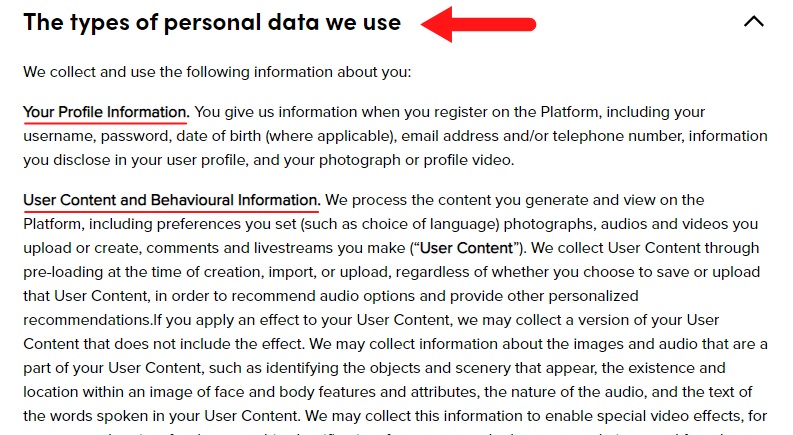
Your Purposes For Collection of Personal Information
Your Privacy Policy must contain a section detailing the purposes, or reasons why, you collect the personal information you collect.
For example, a person's email address or phone number might be collected to enable users to create an account.
Here's an example:
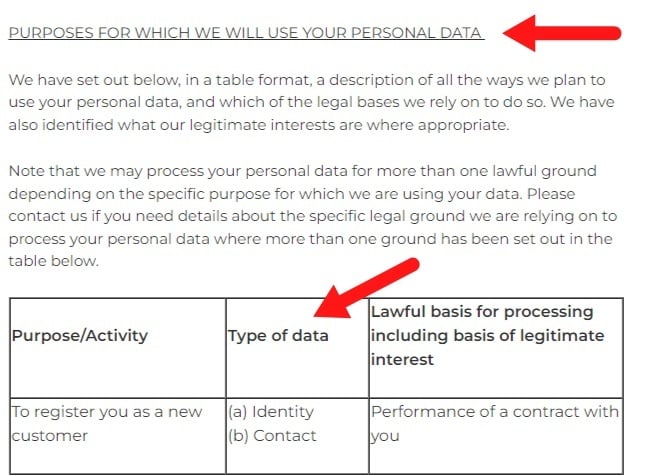
Here's another example of the information presented in a list format:

If You Share Any Personal Information With Third Parties
If you share personal information with third parties, you should have a clause explaining how, why, and with whom you share the personal information.
For example, if you operate an OTA (Online Travel Agent) website, you will need to share customers' details with the airlines you book them with.
Here's an example of this from Booking.com:
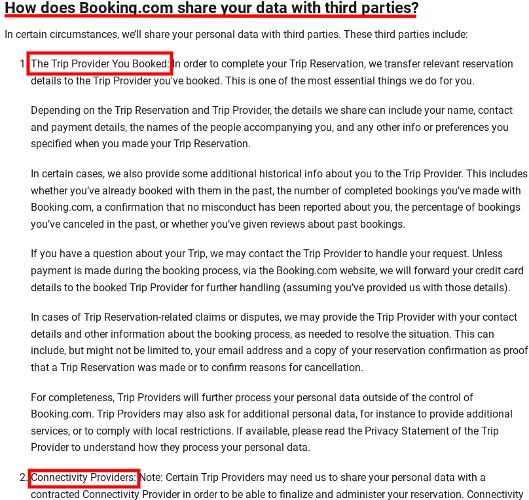
What Rights Consumers Have Regarding Their Personal Information
Privacy laws require businesses to inform consumers about their rights regarding their private personal information.
For example, the CCPA/CPRA requires businesses to inform consumers about their right to access the personal information collected about them and their right to submit a deletion request, amongst others.
Airbnb does this by providing a table that explains user privacy rights:
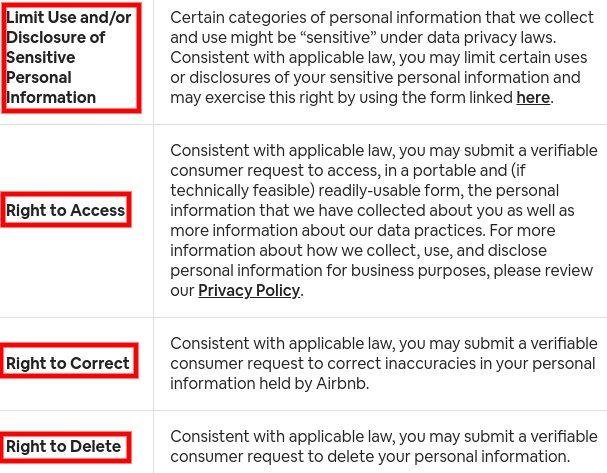
Your Contact Information
Always include at least one method for users to contact you if they have any questions regarding their privacy rights or your privacy practices. This can be a phone number, email address, online contact form, or any other method that works.
Make sure to display this information within your Privacy Policy.
Here's an example of a clause that discloses a number of ways a user can contact the company:
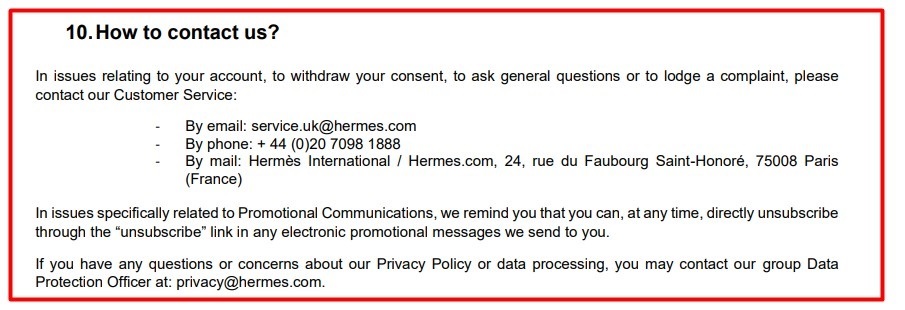
Where Should You Display Your Travel Website's Privacy Policy?
When displaying your Privacy Policy, place it in areas where it will be easily accessible to visitors at any and all times.
By including your Privacy Policy in the footer, you can ensure that it shows up on every page across your site. Your website footer is a great place to add a link to your Privacy Policy. Users know to look here for important links, too.
Here's how Spirit Airlines does this:
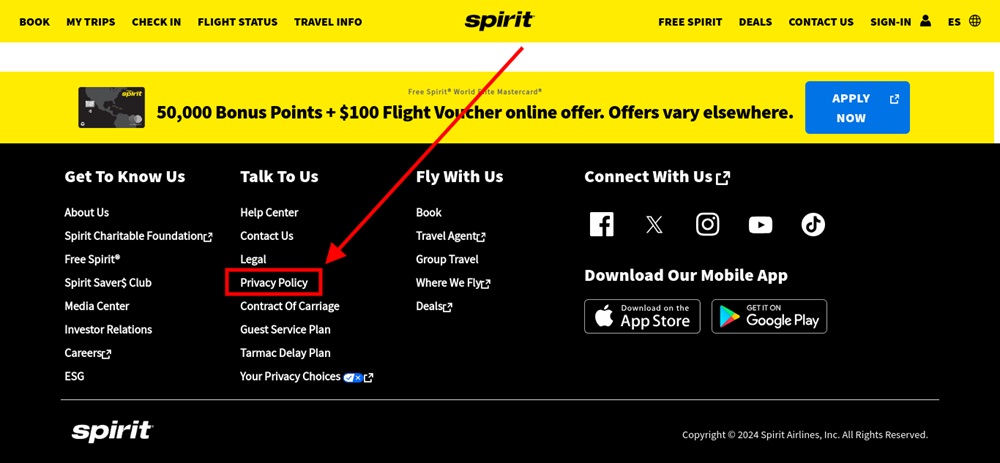
Similarly, Hotels.com includes a link to its Privacy Policy in a footer menu titled Policies:
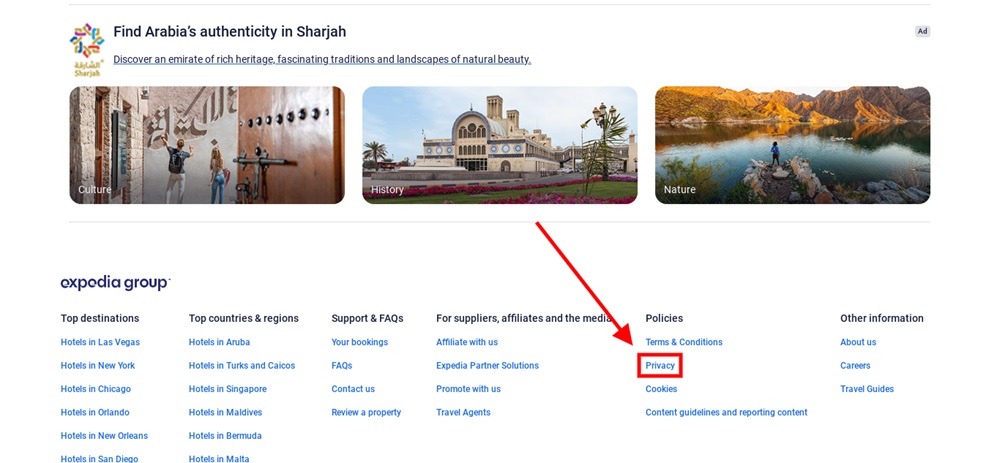
In addition, you should display your Privacy Policy to visitors when you collect personal information.
Some examples of such places can be:
- Email newsletter sign-up forms
- Booking checkout page
- Create account forms
Here's how this can look:
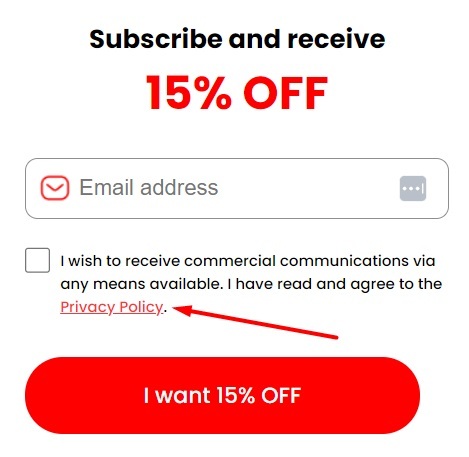
If you have a mobile app, include a link to your Privacy Policy within an in-app menu. Common placement is within a Settings or Legal menu, as seen here:
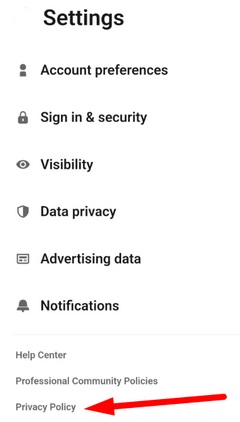
How Do You Get Consent to Your Travel Website's Privacy Policy?
The best way to obtain consent to your Privacy Policy is to provide a checkbox which users can tick off as a method of providing consent. This is referred to widely as an "I Agree" checkbox.
Add a checkbox next to a statement that makes it very clear that by checking that box, the user is explicitly agreeing to your Privacy Policy. Link to the Privacy Policy as well so users can quickly and conveniently access information about your privacy practices before giving their consent.
Here's an example. You can see how the text next to the checkbox makes it abundantly clear what checking the box will do:
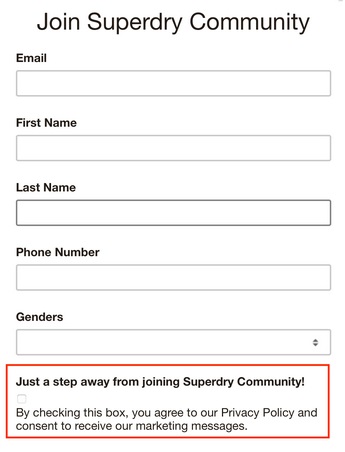
Here's another example. Note the links included to the relevant legal agreements, including a Privacy Notice:
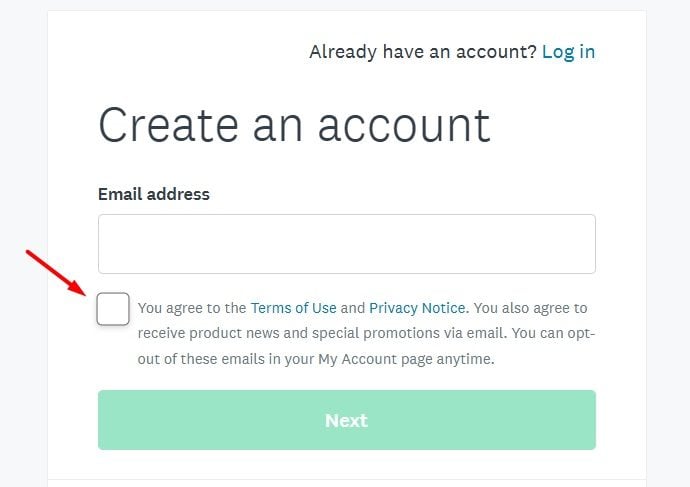
Summary
If you run a travel website and collect personal information about visitors, you legally need to have a Privacy Policy.
Your Privacy Policy should disclose the following information:
- What personal information you are collecting
- For which purposes you are collecting the personal information
- Whether you are sharing this personal information with third-parties and, if so, with whom and for which purposes
- Consumers' rights regarding their personal information, such as their right to request that you delete their personal information
- Whether you are collecting information regarding minors
Your Privacy Policy should be easily accessible. The best way to do this is to include it in your website's footer. You should also provide a link to your Privacy Policy when collecting personal information, such as during account creation, email newsletter sign-up, or during the checkout process.
Always get users to give valid legal consent to your Privacy Policy by requiring them to check a box that indicates they have read and agree to your Privacy Policy.

Comprehensive compliance starts with a Privacy Policy.
Comply with the law with our agreements, policies, and consent banners. Everything is included.
